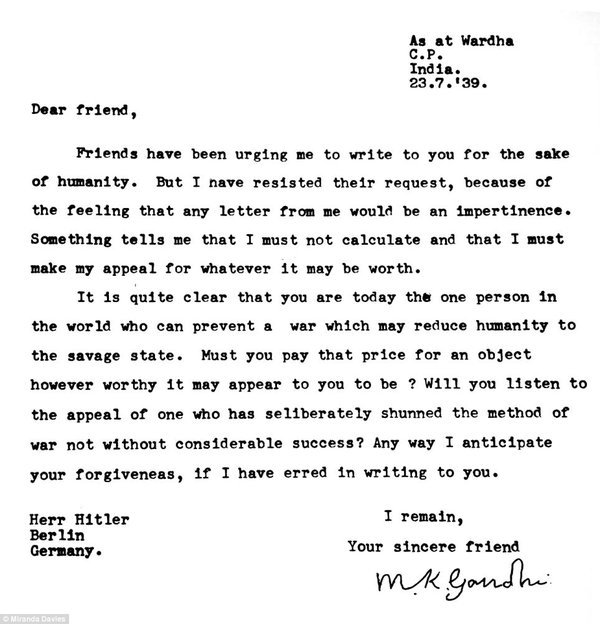New Delhi: Mahatma Gandhi was synonymous with non-violence, as he constantly advocated peace and freedom.
At a time when he and other freedom fighters were leaving no stones unturned to free India from British rule, Gandhi had one eye on world politics also.
No wonder he made several pleas for peace to world leaders, before World War II eventually broke out.
One of Gandhi ji’s notable letters was written to Adolf Hitler, just 10 days before Germany invaded Poland on September 1, 1939.
Referring to Hitler as the “one person in the world who can prevent a war,” the Mahatma stated that many had urged him to reach out to Hitler for the “sake of humanity,” but he was initially hesitant.
“I resisted their request because of the feeling that any letter from me would be an impertinence. Something tells me that I must not calculate and that I must make my appeal,” Gandhi wrote from his Wardha ashram on August 23, 1939.
Pointing out that a war may “reduce humanity to the savage state”, Gandhi asked Hitler if it was worth paying that price for “an object however worthy it may appear to you to be”.
As someone who deliberately “shunned the method of war not without considerable success”, Gandhi made an impassioned appeal to Hitler to avoid war.
Seeking forgiveness if he had “erred in writing” to Hitler, Gandhi concluded the letter by signing off as “Your sincere friend, M. K. Gandhi.”
Check out the letter shared on X @IndiaHistorypic on his 155th birth anniversary.

Obviously, his letter had no impact on the thought process of the dictator who ruled Nazi Germany from 1933 till his demise in 1945.
Even after the conflict started and the war was about to escalate, Gandhi addressed global powers.
In a letter to the British on July 3, 1940, Gandhi urged them to abandon arms and embrace non-violence, stating they should “give all these, but neither your souls nor your minds” to the Nazis.
In July 1942, the Mahatma wrote to the Japanese condemning their aggression against China, besides also writing addressing the Americans and China’s Chiang Kai-Shek, trying to convince them to follow the path of non-violence.


